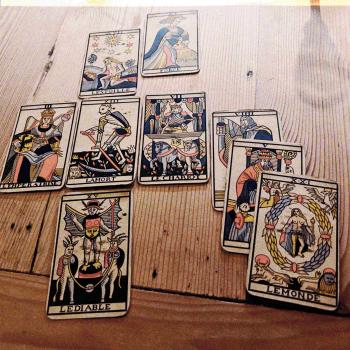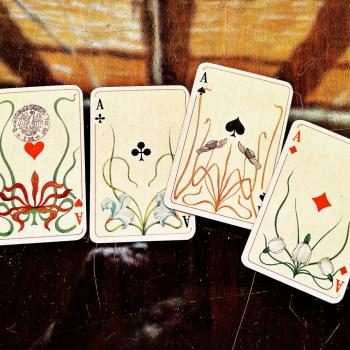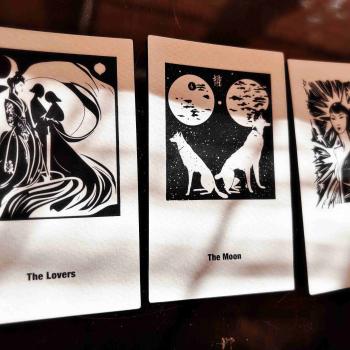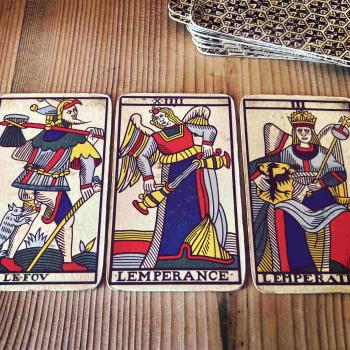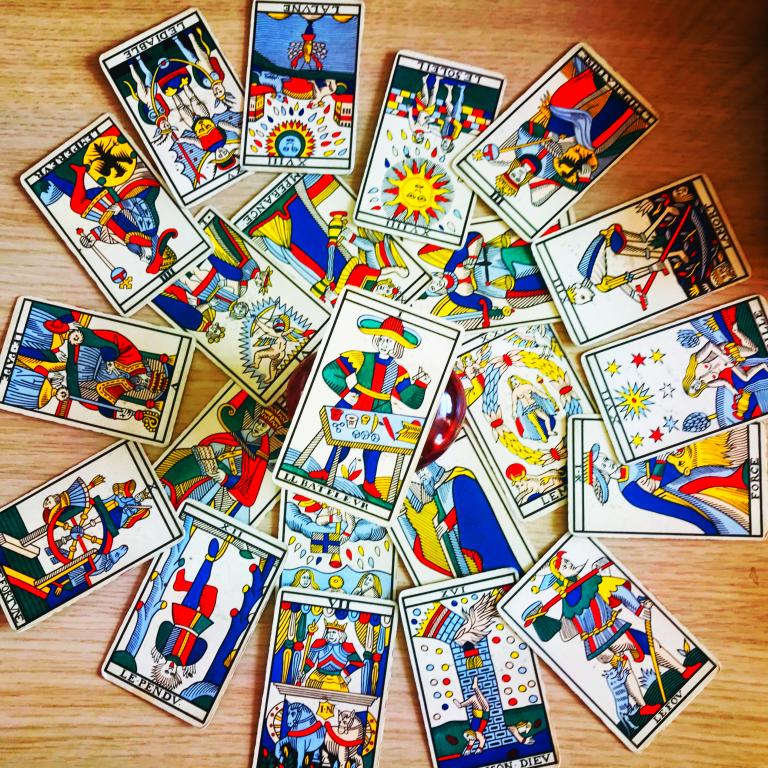
This is Part Two of a series of reflections on the function of the 22 trumps according to specific, yet common questions. See Part One here.
In questions about ‘who done it’, the Hanged Man suggests that it’s best to let it go. You’re hanged, and that’s all you need to know. Unless you yourself are into acrobatics, someone else did the hanging. You may sit there and wonder why anyone would do such a thing to you, but that helps you little with your predicament. I like to think of this card as describing a situation that can’t be helped. If it can’t be helped that others hang you, for whatever reason, you might as well take the inverse view, and practice the art of acceptance. One way or another ‘this too shall pass,’ as wise man Solomon used to say. You may regret the fact that you’re powerless, that others hate your guts and try to rob you of your agency. You may even regret what you’ve done that justly caused your hanging, but it won’t change the situation. Swing like a pendulum with this mantra in your head: ‘I can’t be helped’, and then see what happens.
In questions about what is urgent and significant, Death is your friend. Like a true Zen master, Death instructs you to start with a premise of negation: ‘Not this, not that’. Off with their heads. The trouble with urgency is that it makes us mistake the essential with the inessential. This is stressing. Death says, ‘if you can’t figure out the difference,’ it’s best to say to yourself: ‘I may be clueless about what’s significant in my undertakings, but I’m pretty sure that it’s not this or that approach that I want to take.’ Sometimes it’s easier to figure out your own truth when you consider what you most definitely don’t want to do, no matter how much pressure you may be under. Killing it starts with killing the illusion of actually knowing what’s significant. It may be urgent that you don a new costume or identity, but make sure that before you do that, the crown fits your head. I like it when Death reminds us that it’s infinitely smarter and more rewarding when we stop doing what everyone else is doing. If you want to get a sense of what’s really significant, you must swing the axe, chop some heads, and level the ground. Essentializing to the bones pays off more than saying, ‘maybe this is also something I can do,’ especially if any of the ‘suit’ cards are in the picture. ‘Maybe I can also embody this Empress, if only I can make my declaration of intent loud enough.’ But maybe you want to stop that, fall for hyperbolic speech. It’s not even funny.
In questions about focus, Temperance suggests that you must know what you’re mixing first. How you mix your apples and oranges is the second question. But more importantly, Temperance invites you to ask yourself, as you stand there all tense: ‘Why am I doing this?’ In all the Tarot literature I’ve read, I haven’t seen anyone else ask this question, when Temperance was in the picture: ‘Why am I doing this?’ But it occurs to me that this must be the question: ‘What is the purpose of all this focus? Compromise, the smoothing out of tense relations, interesting alchemy, balancing the act, or regulating flow?’ If Temperance is next to Judgment, I can get a clear sense of how she prepares the bath for the naked people. But next to the Hanged Man, her purpose is not so clear. Make sure you know why Temperance does what she does when in the company of any of the cards in the Tarot pack, as it’s not sure at all that your answer would be one of the set phrases you’ve heard before.
In questions about lies, the Devil suggests that you look at the depth of a narrative and see how shallow it really is. Unless you insist on finding yourself as one of the chained imps, enjoying your symptoms. Think for a second about this spiritual discourse: The Buddha said, ‘find the answers to anything and everything in yourself. There are no others you can go to.’ Now consider what people do: They want depth, heaven and hell, they want to go to charismatic gurus whose promises know no margins. ‘Yes master, please cross the threshold to the underworld for me, and speak with your most important guides, or better yet, make that the Devil himself, as that is so much cooler. Yes, master, I understand that it’s not easy to win the battles with the demons, but I’m sure you’re competent, as you said, and after having crossed 7 seas and 7 mountains, you’ll be able to speak to the first shaman in line who will disclose to you what my secret name is.’ I mean, really. Let us say no more, before the legions will get us. If the Pope is in the picture, the Devil asks you to ask him in the confessional to cut the crap on lineage and external ‘help’. The only valid narrative is the one you create yourself.
In questions about perception, the Tower suggests a reality check. We tend to think that what we build is stable and solid. We get behind doors and the view of the outside gets narrowed. Even if you live in a modern house, where the windows can’t get big enough, you’ll still be missing quite a deal. Being inside doesn’t help either with the wide perspective. You can know the things you surround yourself with, but seeing them every day doesn’t contribute to the expansion of your point of view. Being in a Tower is like being in a Tower. Enjoying the safety of its walls will only last for as long as the roof lasts. Any house requires maintenance. You can perform it regularly or leave it to chance. When external conditions hit, however, the most common response is to panic. Panicking is a terrible state, as it leads to total loss of nerve. In the spur of the moment, you may think, ‘that’s it, I may as well take the jump into the void, and finish this’, but this ‘thinking’ is not thinking. It’s anxiety, apprehension, consternation, hysteria, and dismay. The only cure for panicking is running a reality check. But how are you going to do that, when your response is not rational? When the Tower is in the picture it asks to consider the art of contradiction and paradox. Especially if the Tower is next to the Lovers, or the Fool. For the Lovers, there’s no such thing as a reality check, as a winning perspective is postponed. The Fool has a way of acknowledging all differing opinions as right. The people to the left: ‘The Sun is rising’. The Fool: ‘Yes, you’re right’. The people to the right: ‘No, the Sun is setting.’ The Fool: ‘Yes, you’re also right.’ Meanwhile the Tower crashes. In the midst of paradox there are many wondrous answers. Have you noticed that when you’re hysterical you tend to laugh? Ask yourself why.
In questions about having your wish granted, the Star suggests that while it’s a good idea to not believe in anything, it’s a good idea to have faith, faith in your own naked being. When you put off your clothes to go to bed, how often do you think of the importance of how others see you? I bet it’s zero times. No one is that stupid, to put off their clothes and still think that the most important thing in life is that others think well of you. Generally it helps to adhere to whatever the current trend for beauty is. If you possess the kind of contemporary ideal for beauty, your luck is made, as beauty is still what makes the world go round, coming second to money. That one still wins. And yet. Let’s go back to your nightly affairs. Here you are, naked, and presumably free of the anxiety induced by the cultural threat and demand: ‘You must be beautiful, or else…’ When the Star is in the picture, it simply asks you to consider to what extent you can be magnanimous in the face of fake auras. Consider the idea of aloneness here, because that’s where the ‘mystery’ is, in this aloneness. The Star understands an old wisdom that most people don’t these days, namely, the wisdom that says that whatever you do, you must do it without the wish to be validated. The Star makes offerings, but consider this: Do you think the Star stops even for a second to check with her ‘target group’, with creating lists of testimonials, because hey, people love to ‘relate’ – speaking in terms of trends, there’s nothing as enticing as being able to say, ‘I can also be a star. I can see that it worked for this person here to drink the brilliant elixir and get this thin, so I’m going to do it myself. Yay. I’m not alone in the world with my miserable self. Others are also miserable, but lo and behold, here’s the secret drink. The answer to my ugliness.’ Now, that’s very reassuring, isn’t it? If the Star is next to the Magician, beware of the tricks that are being pulled on you. Unless, of course, you love a fantasy tale, in which case, enjoy the magic carpet.
In questions about influence, the Moon suggests that you look at how impressionable you are. Social media is a great channel where you can test your spine. The more echo chambers proliferate, the more there’s the illusion of strong conviction. Self-appointments abound, and power structures are subtly instituted on the premise that if we can’t all be a star, then we’re most definitely all magical. ‘Woof’ the dogs of the world say, even though no one really knows what they are talking about. But there’s the pretense. Meanwhile, let’s just say that dogs howling at the moon are still dogs howling at the moon. They can seem frightening, so there’s the tendency to just quickly follow, as you never know when they might bite your head off. Such madness, to follow someone because you’re afraid of them. When the Moon is in the picture, it asks you to ponder on what fills your mind, what preoccupies it. If the Moon is next to the Hanged Man, you can be sure that it’s a sign that you give in to the influencing, pulling forces because you’re intimidated. If Force is in the picture, you may think of just what you have in common with the ones who don’t really speak a human language. How can you be on the same page with wild ones? Unless you’re willing to shape-shift yourself, it may serve you well to look into what’s being projected and how that fits your reality.
In questions about relationships, the Sun suggests symmetry. If you make a step towards the other, and the other makes a step towards you, you can have a conversation that’s informed by mutual respect. The good news in such a relationship is that you don’t have to waste time convincing the other of what’s valuable. If you know it, and the other also knows it, then you can have a meaningful transaction. No one is cheating, and no one is bullshitting. There’s no need for masks and costumes here. Nor is there a need for ‘identity’. Everyone is almost naked, and free of having to put up a front or act in inconsiderate ways towards the gratification of self-interest. The Sun next to he Devil, however, is bad news, as we’re here with pride and a hidden agenda. There’s also symmetry here, but it’s all about serving a master you don’t know, one that enslaves you by telling you that what he does is good for you. You believe it because you want to be like the master. You will serve brilliantly, but not for a good cause. The Sun makes you prone to seeing things clearly, when the conditions are auspicious, but on occasion, the garden you find yourself in is not Eden.
In questions about experience, the card of public space, Judgment, suggests that you die for yourself first, and only then participate in the public discourse about what it’s been like to be dead. Why am I thinking of this? Consider this exchange as it’s very common, one I’ve come across recently. Reader of Tarot books in a public forum: ‘I’ve read this book and it’s trash.’ Response: ‘Another one bites the dust. Thank you so much for this. You’ve just saved me dollars and time.’ My silent response to the one in a hurry to bow out of having a personal experience with the ‘trash’: ‘Aren’t you so clever?’ I used to invest time in looking at the profiles of the people who make statements based on endorsements, especially because I’ve noticed an odd phenomenon. As soon as the gratitude is performed, the person who declines ‘the trash’ is then more than willing to appear authoritative on the content of the said trash, often in another social media setting. I don’t want to say that it remains a mystery why anyone would claim to know anything about a product that they never engage with, as such is the function of the social media, to enable all sort of voices, but I am interested in where this type of false broadcasting gets us. When Judgment is in the picture it asks you to pay attention to who you follow, or who people at large follow. Is it a loud voice with zero experience, or an actual authority? Personally, if I take an interest in a new trend that’s trumpeted ever so loudly, I make it a point to invest both time and money to experience the thing for myself. Sometimes I win, and sometimes I lose. From the point of view of experience, however, I win every time. If Judgment is next to Death, I’d develop a practice of running. Running away from fools who think that they know everything, who live by proxy, who have no lives at all, no experience, and no authority. To say that such people are as dead as a coffin would be an insult to the coffin. So much for the idea of enlightenment and awakening that Judgment presents us with. If you want to participate in the public discourse where knowledge is shared, make sure you actually know what you’re talking about first, or you exercise the art of distinction when you listen to others. Not all who yell and point fingers actually have the faintest notion of what it means to be a critical thinker.
In questions about impact, the World suggests self-reliance. The mainstream Tarot literature sees this card as a sign of accomplishment and security. Fair enough. Then we hear about the 4 evangelists protecting the world. That’s also fair. But if you paid close attention, you’ll realize that this card tells you to mind your business. The allies may be there backing you up, but you don’t have to depend on them. In fact, quite the contrary. If the World is next to the Hermit, you may want to take a closer look at your friends. Why would you trust them? Because they say that you can? What access do your allies really have to your inner world? The natural wreath that surrounds you is not one of their making. When it comes down to it, only you alone know exactly what it took to get those laurels. You’re sovereign when you’re self-reliant, not co-dependent. Orchestrating the world from that position of confidence and excellence is not only something to aim at, but something to practice when you remember what you are, and what your place in the world is exactly.
In questions about deceit, the Fool suggests that you start with looking at yourself. What do you fool yourself with? This is the question that I asked on April Fool’s day that I shared with others. My reflection on that day was based on the observation that, at the collective level, we tend to fool ourselves about our significance. I offered a string of questions for contemplation that you can have here too: To what extent do you think of whatever you do as being awfully important? Why is pouring your soul into whatever you do awfully important? Are you sure you’re not fooling yourself in thinking that what you do is awfully important? What would happened if you stopped thinking that what you do is awfully important? The Tarot literature sees the Fool as a symbol of freedom. I prefer to look at the cards from the point of view of assessing their cultural function. The Fool bumbles about without an aim and direction. If he’s free, he pays a price for it, often in the form of others pointing a finger: ‘What an idiot.’ Being an idiot, and hence unreliable, is not a desirable state, but being in a state in which you don’t value your existence according to your sense of self-importance is bliss. When the Fool is in the picture, it asks you to think about your disruptive force. How often do you disrupt your habitual patterns? If it never happens, then I suggest you start asking yourself the questions that probe your entitlement to feel special, significant, and able to make a difference. Try being an idiot sometimes. You will gain more than the intangible idea of freedom. You will gain peace of mind.
♠
Stay tuned for cartomantic activities. Right now Cards and Magic is open for registration.








